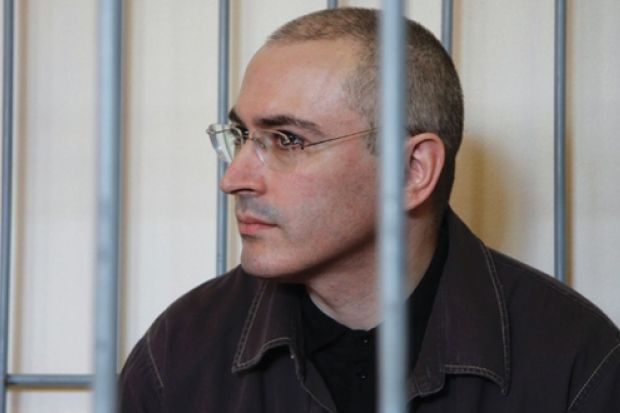Khodorkovsky
Directed by Cyril Tuschi
Released in the UK on 2 March
The first private investment bank in Soviet Russia is started by people who do not know what a chequebook is; the mayor of Yugansk who stands in the way of an oil company's interests is murdered; members of the Komsomol, the Young Communist League, metamorphose into capitalists for whom the adjective "casino" is an understatement; an owner of the Russian oil giant Yukos becomes the richest person in the world under 40. Welcome to post-Soviet Russia, a country that it would take the combined genius of Gogol and Tolstoy to represent; this is the Russia that helped to bring Vladimir Putin to power.
What is salutary about Khodorkovsky, a documentary to be released here two days before Russia goes to the presidential polls, is that it is not amnesiac like so much coverage of Russia. Rather, the film excavates the country's recent past, mining the career of Mikhail Khodorkovsky, and Yukos, the company he at one time owned, to understand how Russia has become what it is.
Khodorkovsky was a one-time good party member who opened the first private investment bank four years before the collapse of the USSR and went on to exploit the radical domestic reforms in the early 1990s. In 1995, he purchased Yukos, which would lead him in 2002 to be named the richest person under 40 in the world. The word oligarch might have been coined to describe this Russian-Jewish chemical engineer.
At one point in Khodorkovsky, Putin is reported as telling the oligarchs that they could make money, no problem, but politics was the Kremlin's business. Khodorkovsky's fatal mistake was not to listen. His company, once an example of shameful corporate governance, began to become more transparent; he set up a charity, and began to support liberal opposition parties and to accuse the Russian state of systemic corruption.
Subsequently arrested on charges of tax fraud, the oligarch was sentenced to eight years in a Siberian prison. More recently, he has endured a second trial where he has been sentenced to another six years, making him unavailable to act as a lightning rod for opposition to Putin during the campaign. He is still in a Siberian prison, 4,000 miles from Moscow.
Khodorkovsky, made by the German film-maker Cyril Tuschi, is just one of a recent slew of films, from Inside Job (2010, Charles Ferguson) on the 2008 bank crisis to Robert Mugabe...What Happened? (2011, Simon Bright), suggesting that cinema documentary like nature abhors a vacuum. As television and print journalism in many parts of the world have withdrawn from a culture of investigative reporting (not least for financial reasons: this documentary took five years to make), documentary made for the cinema seems to be filling the void (pun intended).
In the mid-19th century, Thomas Carlyle encouraged novelists to give up fiction for contemporary history. It is as if film-makers are now following the same injunction. History is simply moving too fast for fiction: "It was too early for a scripted fantasy about Khodorkovsky," says Tuschi.
This is an unremarkable documentary in terms of cinema - for those who think that words are no more than the libretto to visual music. There are lots of words and interviews, largely with uninteresting-looking men, awkward sequences of black-and-white graphic-novel-style animation (including a repeated sequence where an oligarch swims through a pool of gold coins) and archive footage.
But what Tuschi has done - and it is gripping - is to coax from Khodorkovsky's former colleagues, many of whom now live abroad, from London to Tel Aviv, and from others in the Russian elite, confessions that lay bare just how the oligarchs carved up Russia, hand in hand with the state. The film is structured much like a documentary version of Conrad's Heart of Darkness, where the reader is given many incommensurable versions of Kurtz. Versions of Khodorkovsky abound in the film: he has stolen millions from the Russian people, says one; another, that his company carried out the murder of the Yugansk mayor; yet another, that he is a brave man who could have evaded arrest by fleeing abroad but chose not to do so, maybe because he had to purge his earlier crimes or sins.
In the end, near the film's close, we encounter the man himself. Tuschi is granted a 10-minute interview in Siberia, after the second trial, with Khodorkovsky in a glass cage. But by then it is impossible to see the elegant, wry man in front of us without seeing that in all his contradictoriness this oligarch gathers up inside him the history of post-Soviet Russia. Hannah Arendt once spoke of the banality of evil. Khodorkovsky shows us the banality of cancerous corruption. Putin will win, say the polls.
